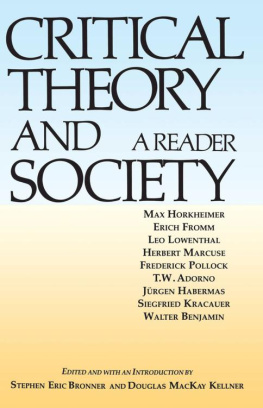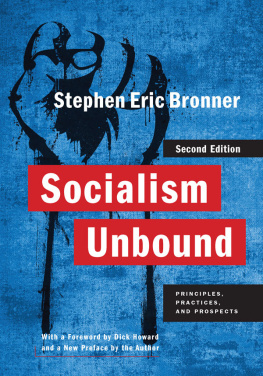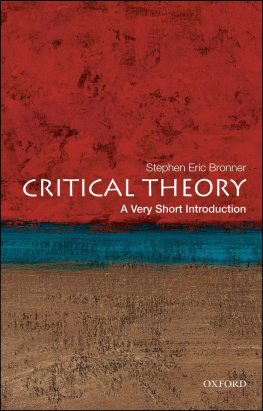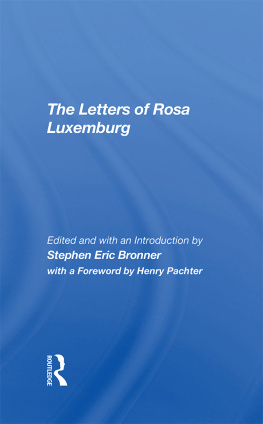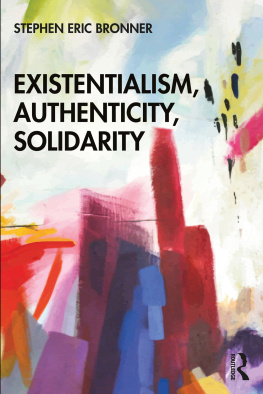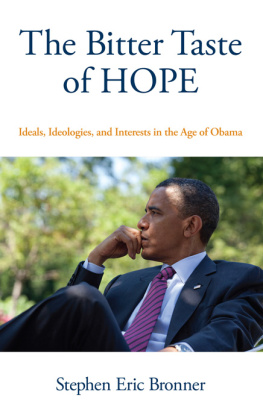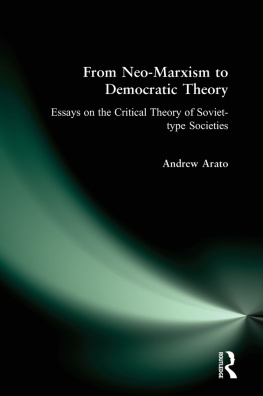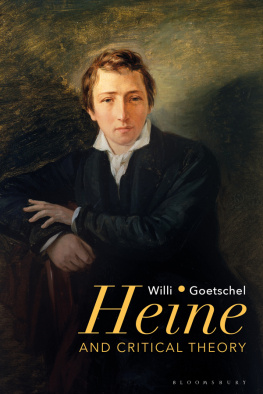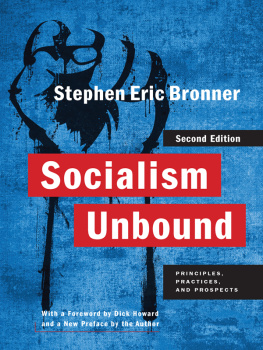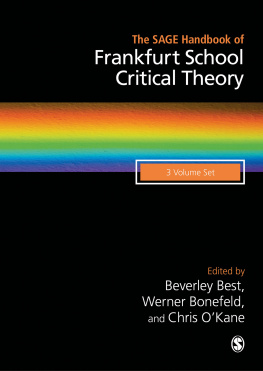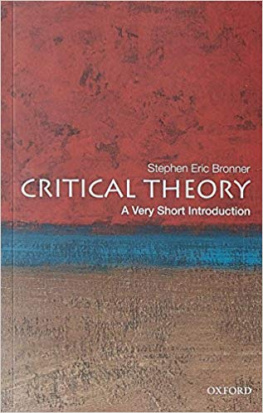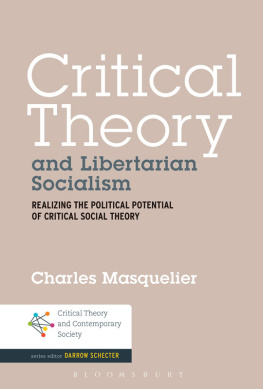Stephen Eric Bronner - Critical Theory and Society: A Reader
Here you can read online Stephen Eric Bronner - Critical Theory and Society: A Reader full text of the book (entire story) in english for free. Download pdf and epub, get meaning, cover and reviews about this ebook. year: 2020, publisher: Taylor and Francis, genre: Politics. Description of the work, (preface) as well as reviews are available. Best literature library LitArk.com created for fans of good reading and offers a wide selection of genres:
Romance novel
Science fiction
Adventure
Detective
Science
History
Home and family
Prose
Art
Politics
Computer
Non-fiction
Religion
Business
Children
Humor
Choose a favorite category and find really read worthwhile books. Enjoy immersion in the world of imagination, feel the emotions of the characters or learn something new for yourself, make an fascinating discovery.
- Book:Critical Theory and Society: A Reader
- Author:
- Publisher:Taylor and Francis
- Genre:
- Year:2020
- Rating:3 / 5
- Favourites:Add to favourites
- Your mark:
- 60
- 1
- 2
- 3
- 4
- 5
Critical Theory and Society: A Reader: summary, description and annotation
We offer to read an annotation, description, summary or preface (depends on what the author of the book "Critical Theory and Society: A Reader" wrote himself). If you haven't found the necessary information about the book — write in the comments, we will try to find it.
Stephen Eric Bronner: author's other books
Who wrote Critical Theory and Society: A Reader? Find out the surname, the name of the author of the book and a list of all author's works by series.
Critical Theory and Society: A Reader — read online for free the complete book (whole text) full work
Below is the text of the book, divided by pages. System saving the place of the last page read, allows you to conveniently read the book "Critical Theory and Society: A Reader" online for free, without having to search again every time where you left off. Put a bookmark, and you can go to the page where you finished reading at any time.
Font size:
Interval:
Bookmark:
CRITICAL THEORY AND SOCIETY
A READER
EDITED AND WITH AN INTRODUCTION BY
STEPHEN ERIC BRONNER AND
DOUGLAS MACKAY KELLNER

Published in 1989 by
Routledge
An imprint of Routledge, Chapman and Hall, Inc.
29 West 35 Street
New York, NY 10001
Published in Great Britain by
Routledge
11 New Fetter Lane
London EC4P 4EE
Copyright 1989 by Routledge, Chapman and Hall, Inc.
All rights reserved. No part of this book may be reprinted or reproduced or utilized in any form or by an electronic, mechanical or other means, now known or hereafter invented, including photocopying and recording, or in any information storage or retrieval system, without permission in writing from the publishers.
Library of Congress Cataloging in Publication Data
Critical theory and society: a reader / edited and with an introduction by Stephen Eric Bonner and Douglas Mackay Kellner.
p. cm.
Includes bibliographical references.
ISBN 0-415-90040-9 ISBN 0-415-90041-7 (pbk.)
1. Critical theory. 2. Frankfurt school of sociology.
I. Bronner, Stephen Eric, 1949 II. Kellner, Douglas, 1943
HM24.C76 1989
301'.01dc20
89-10558
CIP
British Library Cataloguing in Publication Data also available
Stephen Eric Bronner and Douglas MacKay Kellner
Max Horkheimer
Erich Fromm
Leo Lowenthal
Max Horkheimer
Herbert Marcuse
Max Horkheimer
Frederick Pollock
Herbert Marcuse
Theodor W. Adorno
Jrgen Habermas
Siegfried Kracauer
Theodor W. Adorno
Walter Benjamin
Leo Lowenthal
Theodor W. Adorno
Erich Fromm
Theodor W. Adorno et al.
Herbert Marcuse
Erich Fromm
Walter Benjamin
Max Horkheimer
Theodor W. Adorno
Herbert Marcuse
Herbert Marcuse
Jrgen Habermas
There are a number of people to whom we would like to express our gratitude for their encouragement, comments, and support. They include Bob Antonio, Steve Best, Judith Burton, Mark Ritter, Ann Sweeny, and Marianne Stewart. Special thanks are also due to Diana Owen and Victoria Irmiere, as well as to our translators, Micheline Ishay, Mark Ritter, and Peter Wagner. Renee Gibson, Liz Hiles, Patricia Gehle, Kristy Bartlett, Susan Tims, and Lori DeRick provided invaluable help in producing the manuscript. Rainer Funk, the literary executor of the Erich Fromm Archives, provided permission to include some untranslated essays, and Suhrkamp Verlag, Fischer Verlag, Transaction Press, Beacon Press, Harcourt, Brace & Jovanovich, Holt Rinehart and Winston, and W. W. Norton were cooperative in providing permission to reprint the texts for this reader. Thanks are also due to Arguments, New German Critique, Salmagundi, Canadian Journal of Social and Political Theory, and Telos, all of which have sought to develop the legacy of critical theory. Finally, without the support and aid of our editor, Maureen MacGrogan, this book would not have been possible.
StephenEricBronner and DouglasMacKayKellner
Critical Theory and Society: A Reader provides a selection of particularly important essays by members of the Institute for Social Research. Founded in 1923 in Frankfurt, Germany, it became the first formally unaffiliated Marxist-oriented institute in Europe. Under its most influential director, Max Horkheimer, its members attempted to revise both the Marxian critique of capitalism and the theory of revolution in order to confront those new social and political conditions which had evolved since Marx's death. In the process a "critical theory" of society emerged to deal with those aspects of social reality which Marx and his orthodox followers neglected or downplayed.
The term critical theory itself was only coined in 1937, after the majority of the Institute's members had already emigrated to the United States following the triumph of Hitler. The concept was initially a type of code which, while differentiating its adherents from prevailing forms of orthodoxy, also tended to veil their radical commitments in an environment that was hostile to anything remotely associated with Marxism. But the term stuck and soon was used to encompass and define the general theory of contemporary society associated with Max Horkheimer, Herbert Marcuse, T. W. Adorno, Leo Lowenthal, and Frederick Pollockas well as with Jrgen Habermas and others who later undertook to continue the tradition.
We have assembled this reader in the belief that critical theory can promote important developments in social theory today. Growing dissatisfaction with the academic division of labor and the dominant views in the various disciplines have led to increased interest in both theoretical and political alternatives. Critical theory offers a multidisciplinary approach to society which combines perspectives drawn from political economy, sociology, cultural theory, philosophy, anthropology, and history. It thus overcomes the fragmentation endemic to established academic disciplines in order to address issues of broader interest.
An antidote to the frequently noncritical quantitative approaches within contemporary social science, critical theory also provides a potentially more useful and politically relevant alternative than currently fashionable approaches like existentialism and phenomenology, poststructuralism and postmodernism, as well as the various versions of humanist idealism which are periodically recycled and repackaged. By contrast, critical theory maintains a nondogmatic perspective which is sustained by an interest in emancipation from all forms of oppression, as well as by a commitment to freedom, happiness, and a rational ordering of society. Eschewing divisions between the humanities and the social sciences, it thus sets forth a normative social theory that seeks a connection with empirical analyses of the contemporary world.
Fundamentally inspired by the dialectical tradition of Hegel and Marx, critical theory is intrinsically open to development and revision. Inherently self-critical, it offers a well-articulated standpoint for thematizing social realityunlike the current postmodern theories which attack all forms of thought in an undifferentiated manner. Against all relativistic and nihilistic excesses, critical theory seeks an emancipatory alternative to the existing order.
The diversity of interests and insights among critical theorists made the choice of texts for this book particularly difficult. Our selection was guided by an attempt to emphasize the most characteristic theorists and themes within the tradition. We also sought to balance the historical importance of any given text with its contemporary relevance. Finally, without sacrificing intellectual quality, we tried to choose texts which were somewhat less esoteric than some for which the critical theorists are infamous.
This reader focuses, for the most part, on the "inner circle" of the first generation of critical theorists, which consisted of Horkheimer, Adorno, Marcuse, Lowenthal, Pollock, and Erich Fromm. Yet we have also included texts by Siegfried Kracauer and Walter Benjamin, who were to varying degrees associated with critical theory, as well as selections from Jrgen Habermas, who is clearly the most significant member of the second generation. Unfortunately, space constraints forced us to omit texts by contemporary critical theorists such as Oskar Negt, Alfred Schmidt, Claus Offe, and Albrecht Wellmer. We also could not include works by such significant members of the Institute as Karl Wittfogel, Franz Neumann, Otto Kirchheimer, Franz Borkenau, and Henryk Grossmann, as well as related theorists like Karl Korsch and Ernst Bloch, who were occasionally supported by the Institute orin Korsch's casepublished by its journal.
Font size:
Interval:
Bookmark:
Similar books «Critical Theory and Society: A Reader»
Look at similar books to Critical Theory and Society: A Reader. We have selected literature similar in name and meaning in the hope of providing readers with more options to find new, interesting, not yet read works.
Discussion, reviews of the book Critical Theory and Society: A Reader and just readers' own opinions. Leave your comments, write what you think about the work, its meaning or the main characters. Specify what exactly you liked and what you didn't like, and why you think so.

